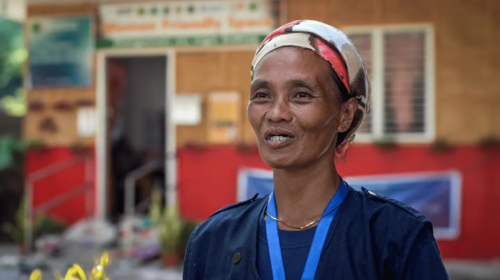Updates
For indigenous women in the Philippines, women-friendly safe spaces extend a bridge to healthcare
24 Apr 2025DATU ODIN SINSUAT, Philippines – In remote, secluded villages of the province of Maguindanao, Jacqueline and a team of community volunteers connect other indigenous women to essential health services, augmenting local efforts to improve maternal, child and newborn health.
Jacqueline is a solo mother of seven and a proud facilitator of a UNFPA-supported women-friendly safe space. She is also part of the indigenous Teduray tribe, which dwells in remote areas of Maguindanao. Health services are scarce due to long distances and high costs.
The province is part of the Bangsamoro Autonomous Region in Muslim Mindanao. In 2022, the region had low rates of births in health facilities or assisted by skilled birth attendants. Shares reached only 39.1 per cent and 42.4 per cent, respectively, lagging behind levels in other parts of the Philippines.
With Australian Government support, UNFPA is helping to close this gap through five women-friendly safe spaces in Maguindanao. The project is part of the Resilient Livelihoods Development programme jointly implemented with the Food and Agriculture Organization of the United Nations.
Women-friendly safe spaces provide protection, information and support to women and girls. The facilitators of the spaces, all trusted members of the community, monitor health needs, the status of people who are older or have disabilities, and cases of gender-based violence.
Jacqueline works closely with the local midwife to provide maternal care to women who come to the spaces, including through regular follow-up visits to their homes.
Overcoming terrains and traditions
Doing rounds in the community is a challenging task due to rugged terrain, rapid rivers and unpredictable weather. “Sometimes, you visit a house on one hill, then have to hike to the next one on a different hill under the intense heat of the sun, all while trekking steep cliffs along the way,” Jacqueline told UNFPA.
“There were also times that we would encounter strong rains, [or worse], we would have to go against strong currents while crossing rivers and arrive at our destinations drenched.”
Beyond the physical obstacles, misconceptions and practices rooted in tradition are hard to overcome. One key challenge is low demand for health services, especially among pregnant mothers. Another is a growing hesitancy to immunize newborns.
“Some in the village would say we have survived without a vaccine or any check-up in the health centres, yet we are still alive,” Jacqueline said. “But in reality, they do not know that we have high mortality of children because they do not seek healthcare.”
Busting myths with each house visit
As a member of the tribe and a mother herself, Jacqueline readily understands the issues faced by mothers in her community. She convinces them to attend regular prenatal check-ups to reduce the risks of miscarriages and other pregnancy-related complications. During these conversations, she emphasizes the importance of immunizing babies, citing a recent measles outbreak as a cautionary tale.
Jacqueline also encourages expectant mothers to deliver in birthing facilities, assisted by a trained healthcare professional. By welcoming them to stay in the women-friendly safe space during labour, attended by a midwife, she eases one major worry. Many pregnant indigenous women opt for home births simply due to long travel distances.
Dr. Anwar Nur, the chief municipal doctor, recognized the work of the volunteers from the women-friendly safe spaces. “They were very instrumental because our rural health staff are not enough, especially when we were combating the measles outbreak, and we had a massive immunization campaign,” he said.
A single mom with open arms for her community
Jacqueline described how being a facilitator has brought her strength and self-confidence. As a single mother with no steady income, an allowance for her work helps support her children.
Even with many responsibilities, Jacqueline’s arms are always wide open to those in need.
“Raising my kids and providing for their daily needs is tough, but the fulfilment I get from helping my tribe is already a priceless gift."
